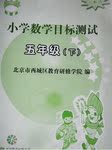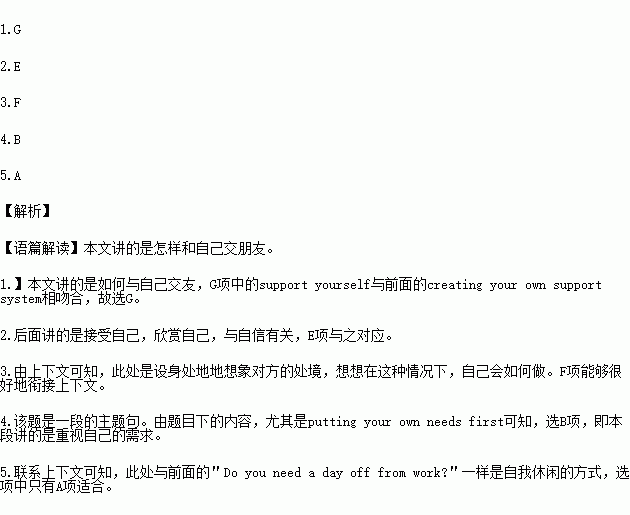题目内容
根据短文内容,从短文后的选项中选出能填入空白处的最佳选项,选项中有两项为多余选项。
Be Your Own Best Friend
Why would you want to become your own best friend? There are a number of benefits of creating your own support system from within rather than relying on your partner, friends or family to be there for you when you’re suffering. We all have it in us to give ourselves what we need, without seeking it from outside. ____1____ Here’s how to become your own best friend.
1. Be nice to yourself.
The first step in becoming a friend to yourself is to treat yourself like you would treat a friend. ____2____ Start by accepting your good qualities, talents and abilities and begin to appreciate yourself.
2. Imagine how you would support a friend in the same situation.
Think about a loved one, a friend, a family member, or someone dear to you and imagine that they are in the same situation you are facing. ____3____ Then consider how to best offer help and advice to them. Allow yourself to feel supported, and give yourself what you need.
Write down the words that you would say to your greatest friend and then say them gently to yourself.
3. ____4____
Following the theme of considering how you would help a dear friend, you need to start taking your own advice and putting your own needs first. Do you need a day off from work? ____5____
Whatever it is that you need, allow yourself to put it at the top of the list rather than the bottom. Use these methods to become your own best friend and start being there for yourself!
A. A long hot bath?
B. Honor your needs.
C. Believe in yourself.
D. Help them first and then they will help you.
E. That means that you need to stop being doubtful of yourself.
F. Think about how they’re struggling, suffering with this problem.
G. Isn’t it far better to know how to support yourself in times of need?
 目标测试系列答案
目标测试系列答案阅读理解
体裁 | 话题 | 词数 | 难度 | 建议时间 |
记叙文 | 我与Paul Newman之间的深厚友情 | 291 | ★★★☆☆ | 7分钟 |
(2017·新课标全国卷II,B)I first met Paul Newman in 1968, when George Roy Hill, the director of Butch Cassidy and the Sundance Kid, introduced us in New York City. When the studio didn’t want me for the film — it wanted somebody as well known as Paul — he stood up for me. I don’t know how many people would have done that; they would have listened to their agents or the studio powers.
The friendship that grew out of the experience of making that film and The Sting four years later had its root in the fact that although there was an age difference, we both came from a tradition of theater and live TV. We were respectful of craft(技艺)and focused on digging into the characters we were going to play. Both of us had the qualities and virtues that are typical of American actors: humorous, aggressive, and making fun of each other— but always with an underlying affection. Those were also at the core(核心)of our relationship off the screen.
We shared the brief that if you’re fortunate enough to have success, you should put something back— he with his Newman’s Own food and his Hole in the Wall camps for kids who are seriously ill, and me with Sundance and the institute and the festival. Paul and I didn’t see each other all that regularly, but sharing that brought us together. We supported each other financially and by showing up at events.
I last saw him a few months ago. He’d been in and out of the hospital. He and I both knew what the deal was, and we didn’t talk about it. Ours was a relationship that didn’t need a lot of words.
1.Why was the studio unwilling to give the role to the author at first?
A. Paul Newman wanted it.
B. The studio powers didn’t like his agent.
C. He wasn’t famous enough.
D. The director recommended someone else.
2.Why did Paul and the author have a lasting friendship?
A. They were of the same age.
B. They worked in the same theater.
C. They were both good actors.
D. They had similar characteristics.
3.What does the underlined word "that" in paragraph 3 refer to?
A. Their belief.
B. Their care for children.
C. Their success.
D. Their support for each other.
4.What is the author’s purpose in writing the text?
A. To show his love of films.
B. To remember a friend.
C. To introduce a new movie.
D. To share his acting experience.

